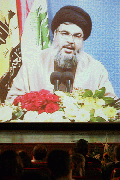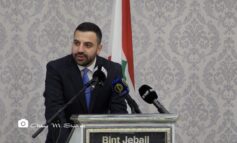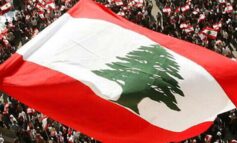
BEIRUT — Hassan Nasrallah, the secretary-general of Hizbullah, has announced his group’s agreement to a prisoner exchange deal with Israel.
In a televised speech on Wednesday, the Hizbullah leader said he expected the swap to take place in one to two weeks.
He said that the exchange should include the release of Samir Kantar, a Lebanese prisoner who is serving multiple life terms for infiltrating northern Israel in 1979 and killing three Israelis — a man, his 4-year-old daughter and a police officer.
“I will not set an exact date. The sooner it takes place the better,” he said.
“I believe that in a week or two it will be implemented … July 15 is the most probable, a bit before or a bit after.”
The deal — approved by Israel on Sunday — would see Hizbullah return two captured Israeli soldiers, believed to be dead, for five Lebanese prisoners and the remains of around 200 suspected Lebanese, Palestinian and Arab fighters.
“We should also gain further information as to the fate of those fighters missing in previous wars, especially those who disappeared before 1982, and after 1982,” Nasrallah said.
Al Jazeera’s Rula Amin, reporting from the southern suburbs of Beirut, said that Nasrallah felt he had proved a point in the group’s handling of Israel and its policies.
“He said the prisoner swap proved that Hizbullah and Lebanon can get what it wants from Israel without making political concessions, or without signing a peace treaty,” she said.
“He believes success can only come through fighting Israel. He also maintains that the country is weaker than many think.”
The capture of Ehud Goldwasser and Eldad Regev, two Israeli army reservists, in a cross border raid in July 2006, triggered Israel’s 34-day war on Hizbullah in Lebanon.
At the time, Ehud Olmert, the Israeli prime minister, ruled out negotiations for the soldiers’ return.
He later relented, negotiating through a U.N.-appointed German mediator.
Hizbullah has never confirmed whether the soldiers are still alive and Olmert has said he believes the two are dead.
Nasrallah dismissed speculation regarding the soldiers’ fate.
“We have not released any information to any party about the fate of the two soldiers,” he said.
In his speech Nasrallah said Hizbullah would provide information on missing Ron Arad, an Israeli pilot whose plane crashed in Lebanon in 1986.
Fouad Siniora, the Lebanese prime minister, said the deal represents a failure for Israel and a “national success” for Hizbullah.
The comment was rare praise by Siniora, who has been at odds with Hizbullah, and opposition parties affiliated with the group reflected through the country’s long-running political stalemate.
“The release of the prisoners through a German mediator … marks a big failure, and a very big failure of Israel’s policy which refused, before the July 2006 war, to seal a complete exchange deal,” a Lebanese government statement said.
“This deal … is a new and clear condemnation for Israel, its tactics and its policies.”
In parallel to the prisoner talks, Israel has said it is interested in opening peace talks with Lebanon, a move the Lebanese government has dismissed.
Siniora has often said Lebanon would be the last Arab country to sign a peace treaty with Israel.
On the same day as Nasrallah’s speech, the British government said it was adding the military arm of Hizbullah to its list of banned terrorist organizations.
“This means that it will be a criminal offense to belong to, fundraise and encourage support for the military wing of the organization,” the UK’s home office said in a statement.
It added that the group’s political, social and humanitarian activities would remain unaffected.
The UK lists 59 groups as banned “terrorist” organizations, including al-Qaeda and the Kurdistan Workers’ Party, or PKK.
Tony McNulty, the home office minister, said the British government was taking action amid concerns over Hizbullah’s influence over violence in southern Iraq, where Britain has 4,000 troops based on the outskirts of the city of Basra.
“Hizbullah’s military wing are providing active support to fighters in Iraq who are responsible for attacks both on coalition forces and on Iraqi civilians, including providing training in the use of deadly roadside bombs,” he said.
Nasrallah said the decision came as no surprise.
“It’s normal … from the country which institutionalized the Zionist entity and which is a main partner in uprooting the Palestinian people and establishing the state of Israel,” he said.






Leave a Reply